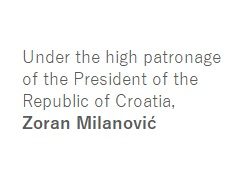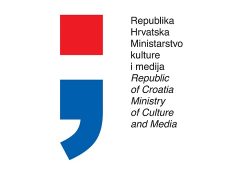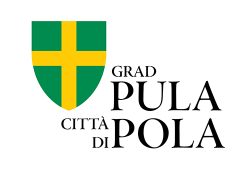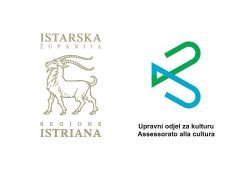SEVENTY YEARS OF THE FESTIVAL
IN COOPERATION WITH THE PUBLIC INSTITUTION PULA FILM FESTIVAL AND THE HISTORICAL AND MARITIME MUSEUM OF ISTRIA – MUSEO STORICO E NAVALE DELL'ISTRIA
GIARDINI
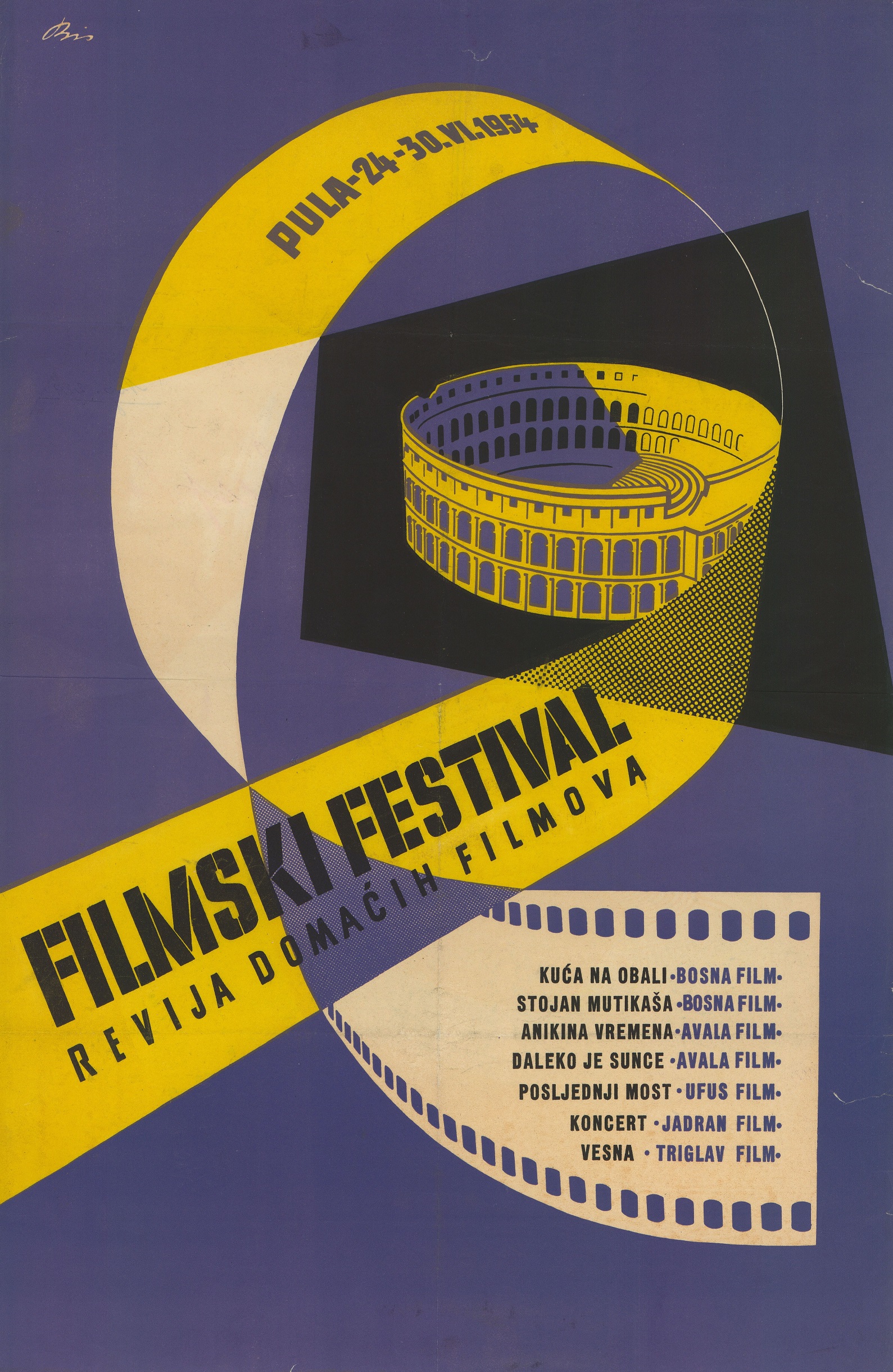
CURATOR : Hana Žerić Šaponja
The exhibition shows almost all segments of life in festival Pula – from the organisational structure, film posters, films, awards, and interesting facts surrounding the Festival. Each year of the Festival is presented with a selection of photographic and documentary material from various holdings of archives, film archives, film centres, libraries and other institutions in Croatia and abroad.
Pula Film Festival is woven into the social fabric of our city. From the very start a long time ago, in 1954, the Festival was the central summer event. All inhabitants of Pula have a personal memory of the festival days: the magnificent fireworks, jumping the fence to enter the Arena or a chance meeting with a film star at Zlatne stijene beach or near the Riviera Hotel. The glamour of the film screen of the most beautiful stage in the world has enchanted the inhabitants of Pula and its many visitors who have been coming to our Festival under the stars for 70 years.
IGOR DRAŽIĆ
IT HAPPENED IN THE EIGHTIES
VALLI CINEMA
OPENING 14. 7. 2023.

The exhibition shows photographs taken between 1983 and 1987 of the atmosphere around the Arena during the Film Festival in Pula.
Igor Dražić (1961) graduated from secondary school in Pula in graphic design. He has exhibited at group exhibitions in Rovinj, Osijek, Koper, Trieste, Novi Sad, Belgrade, Rijeka, and Zagreb, and at solo exhibitions in Pula and Poreč. He has photographed Pula bands Messerscmitt, Spoons, Zhel, Urar, and Gori Ussi Winnetou for their album covers. He is also the author of the photo of Franci and KUD Idijoti published in the Ex YU rock encyclopaedia by Petar Janjatović. He is a member of the Croatian Association of Interdisciplinary Artists.
SLOBODAN IVETIĆ
REMEMBERING ENA
SKUC GALLERY
OPENING 14 July 2023 – 8 p.m.
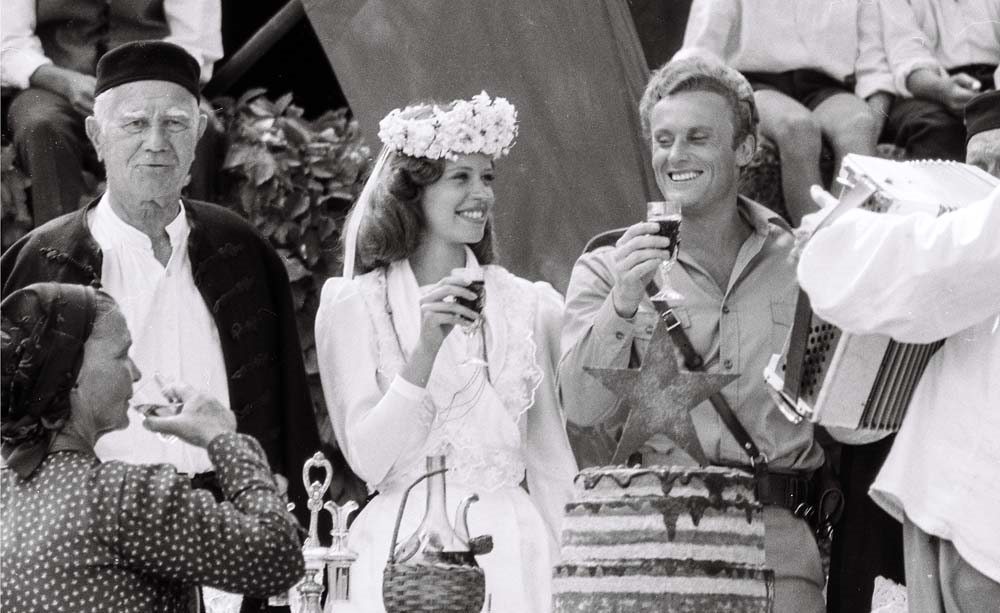
The exhibition shows photographs taken in the summer of 1980 on the Island of Šolta during the filming of The Fall of Italy, directed by Lordan Zafranović. Slobodan Ivetić, student of directing and camera at the time, travelled to Maslinica where the filming was taking place and over the course of two months took around 1,500 mostly black and white photographs that show the beginning of the brilliant career of Ena Begović in her twenties.
Slobodan Ivetić graduated in directing and camera from IDHEC film school in Paris, in directing from the Conservatory of French Cinematography, and in film theory from Sorbonne. He directed 11 short and documentary films, and worked on around twenty film projects directed by European, American, and regional directors as assistant or first assistant director. From 1990 to 2000 he worked in film distribution in Prague, where he founded the first private distribution company. He wrote and directed the feature-length documentary Kreka: Dreamcatcher, which the Association of Film Artists of Serbia named film of the year in 2021. Since 2022 he has acted as president of the board of Zvezdara Theatre.
STANKO HERCEG
NATURAL / UNNATURAL
MAKINA GALLERY
OPENING 14 July 2023 – 9 p.m.
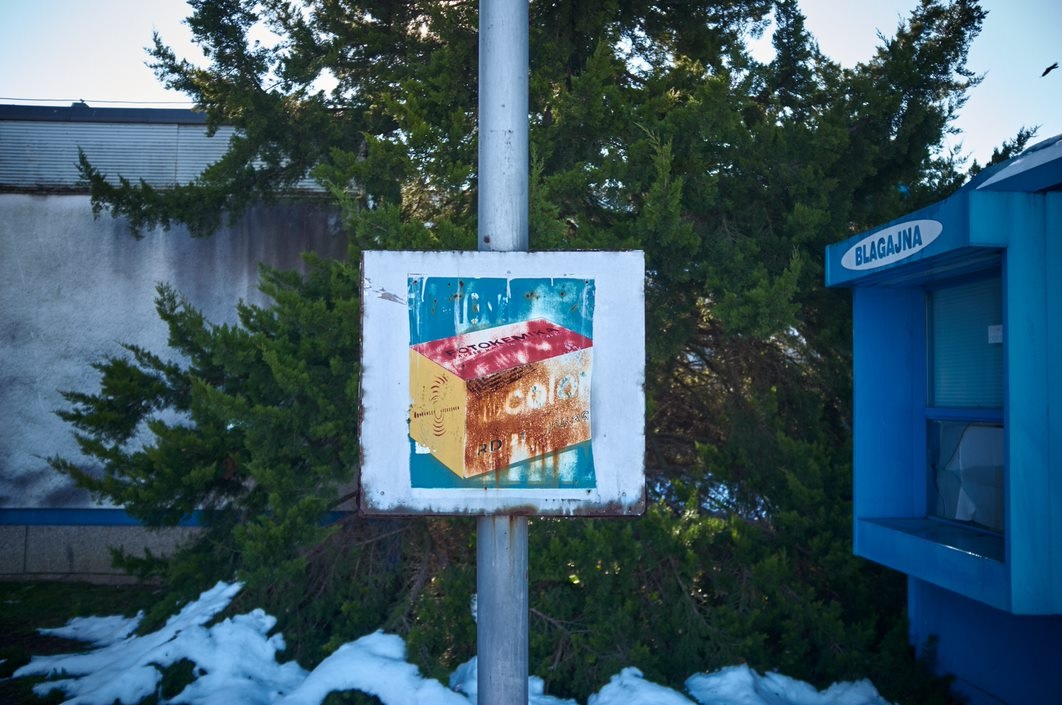
The exhibitions shows around twenty surreal colour shots that Stanko Herceg took in the period from 2015 to 2022. In the words of art historian Željko Marciuš, by photographing unconventional and often strange objects in the urban or natural environment, the author fully ironises the common belief of what is natural and what isn’t, questioning the subjectivising symbolic universe in which everyone finds something else to be unacceptable or abnormal.
Stanko Herceg (1964) graduated in film and TV directing from the Academy of Dramatic Arts in Zagreb. He taught at the School of Applied Arts, Academy of Fine Arts in Zagreb, Faculty of Architecture, Academy of Dramatic Art, and Academy of Applied Arts in Rijeka. He worked as director of photography on a number of fiction, short, documentary, and experimental films, and regularly takes part in Croatian and international film festivals and exhibits his work.
DUŠAN VUKOTIĆ VUD
FILM CARICATURES
HOME OF CROATIAN VETERANS
15-25 July 2023

In only a few days in July back in 1956, the events relating to the first animated film of the new production company Zagreb film unfolded at film speed: first the animated film got the green light for its screening, then a few days later it was screened in the main programme at Pula Film Festival (shorts section), and in the end the official jury presented its author with an award. The animated film in question is The Playful Robot, directed by Dušan Vukotić, the most awarded filmmaker of the 20th century in these parts. It is safe to say that it was precisely Pula and the Arena that symbolically announced, or anticipated the artist’s thematic preoccupation on the one hand – science fiction, and his bravura and award-studded career on the other. Irrespective of the numerous awards he won at the most prestigious film festivals (as well as the Academy Award, of course), for the next 25 years Vukotić continued to be a companion, contemporary, and participant of Pula Film Festival. His films screened at the Festival included his animated films and fiction films (The Seventh Continent, Operation Stadium, Visitors from the Arkana Galaxy), he was also a member of the jury, and author of one of the festival trailers, among other things. As many of his colleagues, Vud received awards at Pula (including the Audience Award), but also went home bitterly disappointed.
Dušan Vukotić (1927–1998) was not just a brilliant filmmaker. Vud was also a multifaceted artist of a unique body of work and high creative reach. Caricatures were one of his preoccupations – in the period from 1957 to 1989 he had a permanent column (caricature) on the last page of Filmska kultura magazine, where he dealt with film and cinema on the whole in his characteristic, visually striking, expressive, dramaturgically ingenious, and even cynical way. To live for film and cinema in socialist Yugoslavia meant being involved at Pula Film Festival as well: films, juries, productions, background games, producers’ problems, etc. The infectiously funny, clear and recognisable in terms of drawing, the caricatures by Dušan Vukotić about Pula Film Festival – that have unfortunately fallen into oblivion in the meantime – are the theme of this exhibition. Besides, no other national film festival in the world can “boast” with having an Academy Award winner as its chronicler, even if it was in the form of caricatures…
CINEMANIAC > THINK FILM 20232023.
DOUBLE EXPOSURE
MOTIKA GALLERY – Pula City Gallery
OPENING • 17 July 2023 – 8 p.m.

CURATORS • Branka Benčić, Aleksandra Sekulić, Marta Baradić, Tanja Vrvilo
ORGANISERS • Apoteka – Prostor za suvremenu umjetnost • Apoteka – Space for Contemporary Art
IN COOPERATION WITH • medjumuzejskim projektom Vidljive, UO Film Protufilm / Filmske mutacije – Festival nevidljivog filma, Kino Katarina
Double Exposure presents film and video works by Erna Banovac, Dunja Ivanišević, Tatjana Ivančić, Sanja Iveković, Ljubica janković, Divna Jovanović, Jagoda Kaloper, Bojana Marijan, Bogdanka Poznanović and Irena Vrkljan.
The twenty-second edition of the side program Cinemaniac > Think Film of the 70th Pula Film Festival, Double Exposure, presents a look back, a fragmented and cursory glance at the audiovisual production of women in the cultural space of the Socialist Federal Republic of Yugoslavia during the 1960 and 1970s. It brings together several curators, initiatives, programmes, and research interested in the affirmation of the visibility of women, artists, authors, filmmakers in art and film – from the exhibition, research, and accompanying film and video programme of the current inter-museum project Vidljive (Visible), which includes the RONDO programme – from exposure to oblivion and back, to Film Mutations – Festival of Invisible Cinema and the Katarina Cinema.
Double Exposure is not attempting the impossible – establishing a complete overview that is inherently fragmented and elusive, but wants to remind, expose, or take another look at certain artistic positions and phenomena. It brings together select amateur, experimental film and video, or short documentarist interventions created by female artists and film authors and amateurs in the cultural space of Socialist Federal Republic of Yugoslavia, examining the practices extending from avant-garde experiments, documenting everyday life, works based on video recordings, and performances. The works explore the positions of identity, strategies of self-representation, and media experiments. They were created in the 1960s, a time marked by a wave of enthusiasm in cinema clubs and cinema amateurism, especially in cinema clubs in Zagreb, Split, and Belgrade, and the time when video appeared as a medium within the practice of conceptual and post-conceptual art related to the New artistic practice of the 1970s. The programme brings together artistic positions, contexts, curatorial practices, and institutions that frame and shape the production of moving images of female artists in the Socialist Federal Republic of Yugoslavia: its presentation, care, interpretation, visibility, availability, and circulation. Double Exposure brings together some of anthological works of art exhibited and recognised the world over, as well as some forgotten works by the female artists. Double exposure means shaping the position of double visibility: artistic and audiovisual production by women at the central place of representation of cinema.
THANKS TO Museum of Modern and Contemporary Art Rijeka, Museum of Contemporary Art Zagreb, families of Bogdanka Poznanović and Milica Badalić, Kino klub Split, Kino klub Zagreb, Miroslav Bata Petrović, Zagreb film, Provincial Secretariat of the Autonomous Province Vojvodina and the Yugoslav FIlm Archives, and Antje Ehmann and the Farocki Institute

